

26/09/2012 How many languages do you speak? — Debating Europe. Today is the European Day of Languages, when Europe celebrates its rich linguistic heritage: the EU’s 23 official languages, the 60 or so regional languages, and the languages spoken by people who’ve come to Europe from other parts of the world.
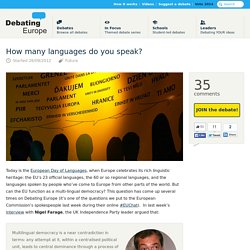
But can the EU function as a multi-lingual democracy? This question has come up several times on Debating Europe (it’s one of the questions we put to the European Commission’s spokespeople last week during their online #EUChat). In last week’s interview with Nigel Farage, the UK Independence Party leader argued that: Multilingual democracy is a near contradiction in terms: any attempt at it, within a centralised political unit, leads to central dominance through a process of ‘divide and rule’. You can tell one nation one thing, and another nation something else, because there is no real communication between the media-circuses of the two, let alone adequate discussion between electorates.
Language diversity: Johnson: Just speak English? 17/09/2013 - The Economist. HOW should the European Union manage its multilingualism?
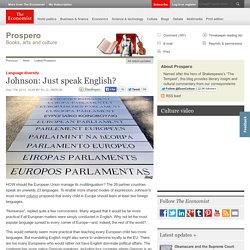
The 28 partner countries speak an unwieldy 23 languages. To enable more shared modes of expression, Johnson's most recent column proposed that every child in Europe should learn at least two foreign languages. "Nonsense", replied quite a few commenters. 24/05/2013 European Union prepares to adopt 24th official language as costs mount, calls for English rise - Public Radio International. The Treaty of Rome in 1957 founded what is now the European Union, and was supposed to be the beginning of the end of nationalism in Europe.
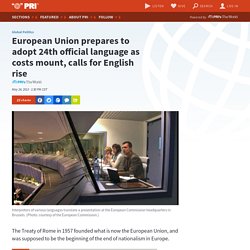
But over a half-century later, walking through any of the EU buildings in Brussels, it feels like nationalism never went away. Officially, deputies and delegates will only speak in their national languages, as a matter of principle. “The proposal is that English should become the single working language of the EU.” Points For/ Against - International debat education association. Dr. Robert Phillipson - International Languages/ Linguistic imperialism. Churchill's first major point is support for USA global dominance.
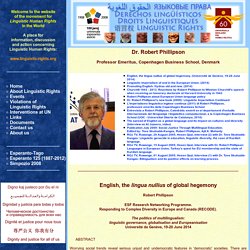
It is camouflaged as 'world responsibility'. In 1943 the British Empire was seriously weakened, British success in the Second World War was dependent on the American war machine, and the British economy was dependent on massive loans from the USA. Secondly, Churchill sees the UK and USA as linked by 'blood and history', blood in Churchill's case being a reference to his American mother. It is factually correct that links between the two countries have been close throughout history. May 2006 Languages Without Borders - Multilingualism and policy - “Europe’s Wealth Consists Essentially in its Variety of Languages” - Goethe-Institut.
Europe speaks many languages.
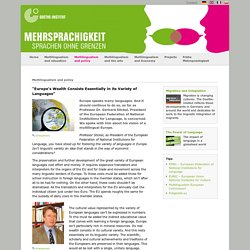
And it should continue to do so, as far as Professor Dr. Gerhard Stickel, President of the European Federation of National Institutions for Language, is concerned.
Europeans and their Languages - European Commission_EN_2012.pdf. Le mythe trompeur de l'anglais. L'anglais se confirme comme la lingua franca de l'Europe. L'anglais s'impose de plus en plus dans les écoles européennes comme la langue étrangère la plus apprise, selon les résultats d'une étude Eurostat.
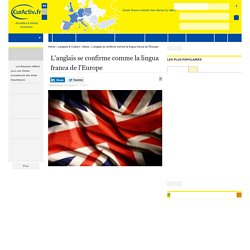
Au sein des États membres, elle est également la langue étrangère la plus parlée, à quelques rares exceptions. L'anglais tient son premier rang - et de loin - sur le podium des langues étrangères les plus étudiées en Europe. En deuxième cycle, les étudiants sont 94% à choisir la langue de Shakespeare, selon de nouvelles données publiées par Eurostat à l'occasion de la Journée européenne des langues le 26 septembre. Loin dernière l'anglais suivent le français, l'allemand et l'espagnol. Près de 19 % des élèves en primaire et dans le premier cycle du secondaire étudient le français. L'enseignement de l'anglais dans le secondaire est presque universel et approche des 100 % dans la plupart des pays. Dans les 28 États membres de l'UE, l'anglais était déclaré être la langue étrangère la mieux maîtrisée par la population âgée de 25 à 64 ans. Comment l’anglais est-il devenu la langue la plus parlée au monde ? - ESL – Séjours linguistiques.
Il y a 500 ans, l’anglais était parlé par 5 à 7 millions de personnes, principalement sur les îles britanniques.

Aujourd’hui, près d’1,8 milliard de personnes parlent anglais dans le monde. Pourquoi l’anglais est-il devenu une langue universelle ? L’anglais domine le monde L’anglais est sans aucun doute aujourd’hui le langage universel et peut être compris presque partout dans le monde scientifique et parmi les gens instruits, c’est aussi la langue du cinéma, de la télévision, de la musique pop et du monde de l’informatique.
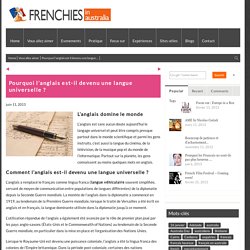
Partout sur la planète, les gens connaissent au moins quelques mots en anglais. Patricia Ryan: Don't insist on English! Jay Walker: The world's English mania. 21/05/2014 European parliament has 24 official languages, but MEPs prefer English - The Guardian. English is the unofficial language of European politics: data from European parliamentary debates, obtained by the Guardian, show that in 2008-12 English had the most airtime.
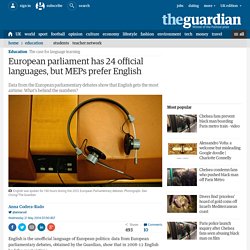
All 764 MEPs are required to attend the monthly plenary sessions held by the European parliament to debate legislative issues. 24/04/2013 Something in common: should English be the official language of the EU? - The Guardian. Money talks, especially in Brussels.
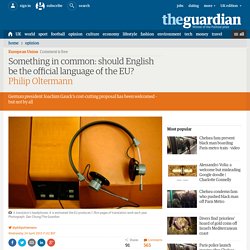
A billion euros are usually "mil milhoes de euros" in Portuguese, or a thousand million. In Spanish, likewise, "billón" means a million million, so billion is "mil millones de euros". Confusingly, "billion" translates as "milijarde" into Croatian, or "miljard" into Dutch. When the French talk of "un billion", they are referring to what Britons call a trillion. 26/09/2014 Most Europeans can speak multiple languages. UK and Ireland not so much - The Guardian. Today is the European Day of Languages. Within the European Union, there are 23 officially recognised languages. There are also more than 60 indigenous regional and minority languages, and many non-indigenous languages spoken by migrant communities.
That’s not counting the many immigrants that call Europe home and bring their mother tongues with them. People from over 100 different countries live in Europe. Just over half of Europeans (54%) are able to hold a conversation in at least one additional language, a quarter (25%) are able to speak at least two additional languages and one in ten (10%) are conversant in at least three. The five most widely spoken foreign languages remain English (38%), French (12%), German (11%), Spanish (7%) and Russian (5%). 04/11/2014 What if Britain left the EU? - The Guardian. Politics: How would Europe regard Britain’s retreat?
With disappointment and anger In a rare uncalculating moment, Boris Johnson wrote last year that, if Britain finally ended its “sterile debate” over Europe by leaving the EU, it would quickly discover “that most of our problems are not caused by Brussels, but by chronic British short-termism, inadequate management, sloth, low skills and a culture of easy gratification and under-investment”. September/October 2013 Why the United Kingdom Shouldn't Exit the EU? - Foreign Affairs. Despite his innate caution and usually sound political instincts, British Prime Minister David Cameron is gambling with his country’s future. In January, in a long-anticipated speech, he called for a wide-ranging renegotiation of the terms of the United Kingdom’s membership in the European Union and promised to put the result up for a straight in-or-out popular referendum by the end of 2017 (assuming his party wins the next election, due in 2015).
A British exit from the EU is now more likely than ever -- and it would be disastrous not only for the United Kingdom but also for the rest of Europe and the United States. If London does ultimately cut the rope, it will not be the result of rational political or economic calculations. By caving in to the demands of the right wing of his party, Cameron appears to be falling into the same trap that his predecessors fell into. To continue reading, please log in.
Don't have an account? Register. The Yes to Europe campaign - British Influence. List of territorial entities where English is an official language - Wikipedia. Map of nations in which English is an official language or majority language (dark blue) or an official language but minority language (light blue) The following is a list of territories where English is an official language, that is, a language used in citizen interactions with government officials. In 2014, there were 58 sovereign states and 21 non-sovereign entities where English was an official language. Many country subdivisions have declared English an official language at the local or regional level. The majority of countries where English is an official language are former territories of the British Empire. Notable exceptions include Rwanda, which was formerly a Belgian colony, and Eritrea, which was an Italian colony where the British Empire maintained control only in World War II and shortly after (1941–1952).
Sovereign states[edit] Non-sovereign entities[edit] Country subdivisions[edit] See also[edit] [edit] ^4 Guam is an organized unincorporated territory of the United States. Languages of Europe. Not to be confused with Indo-European languages. Map of the major European languages Most of the languages of Europe belong to the Indo-European language family.
This family is divided into a number of branches, including Romance, Germanic, Baltic, Slavic, Albanian, Celtic, Armenian and Hellenic (Greek). The Uralic languages, which include Hungarian, Finnish, and Estonian, also have a significant presence in Europe. The Turkic and Mongolic families also have several European members, while the North Caucasian and Kartvelian families are important in the southeastern extremity of geographical Europe. English language in Europe. Knowledge of English in the EU and Iceland Knowledge of English as a foreign and second language in the EU member states (plus Turkey), in per cent of the adult population (over the age of 14), 2005. Data taken from an EU survey.[1] The English language in Europe, as a native language, is mainly spoken in the United Kingdom and Ireland.
Outside of these states, it has a special status the Crown dependencies (Isle of Man, Jersey and Guernsey), Gibraltar (one of the British Overseas Territories) and Malta and Cyprus (two former British colonies). Mediterranean Lingua Franca - Wikipedia. Map of Europe and the Mediterranean from the Catalan Atlas of 1375 The Mediterranean Lingua Franca, or sabir, was a pidgin language used as a lingua franca in the Mediterranean Basin from the 11th to the 19th century.[2] History[edit] The literal meaning of lingua franca in Italian is "Frankish language",[3] and this description was extended to any language used by speakers of different home tongues to communicate with one another. Its other name in the Mediterranean area was Sabir, deriving from a Romance root meaning "to know". [citation needed] List of languages by total number of speakers - Wikipedia. These are lists of languages by the number of first and second language speakers.
However, particularly because of large uncertainties in estimating the number of secondary speakers, all such lists should be used with caution. In particular, the lists below should be seen as tentative. Ethnologue (2013, 17th edition)[edit] The following languages are listed as having 50 million or more speakers by SIL Ethnologue.[1] Figures are accompanied by dates of the reference used by Ethnologue; an old date means that the current number of speakers may be substantially greater, but even for a recent date the data may be several decades older. A range of dates means that the figure is the sum of data from different years in different countries. 03/08/2011 Should Esperanto be the language of Europe? — Debating Europe. Bonan matenon!
Criticism of Esperanto - Wikipedia. Esperanto was conceived as a language of international communication, more precisely as a universal second language. Since publication, there has been debate over whether it is possible for Esperanto to attain this position, and whether it would be an improvement for international communication if it did. Common objections[edit] A reply to some arguments against Esperanto. Most Esperantists today go easy on such claims, fearing (rightly) that they will be laughed at by those who know nothing about Esperanto.
When Count Leo Tolstoy claimed that he learned Esperanto "in three or four hours" we must assume -- and probably correctly -- that this meant that the polyglot Tolstoy learned, in 3-4 hours, to read Esperanto texts with the help of a dictionary. On the other hand, I've run into far too many cases of people who, in a very, very short period of self-study (usually months, sometimes weeks, rarely -- but not never -- days) have taught themselves to read and write Esperanto better than any language that they learned in school for a period of years, and who -- this latter is an experience I shared -- found that the first time they were actually exposed to spoken Esperanto they had no trouble in understanding it, nor in participating in conversation. Esperanto, an official language of the European Union, now! - Petition. One of the founding principles of the European Union is the equality of languages and cultures.
Sign Language. Global English.